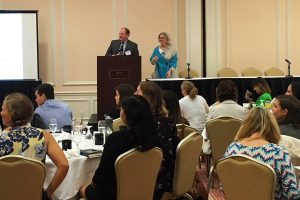
Although they understand and articulate rules and consequences, teenagers take risks nonetheless – in part because of the competing interests of their developing brains.
In a talk delivered to cancer researchers, oncologists, and other health and research professionals attending the inaugural the inaugural North Carolina Adolescent and Young Adult Oncology Symposium, Martha Perry, MD, explained that pleasure-seeking subcortical regions in the brain mature faster than the prefrontal cortex – a region responsible for “higher order” critical thinking. That pattern of development may help explain pleasure-and-reward-seeking behavior in this age group.
“How do you connect with adolescents, knowing all of this?” asked Perry, a board-certified adolescent medicine specialist in the UNC School of Medicine General Pediatrics and Adolescent Medicine team, before going on to describe tricks of the trade for best connecting with teens and young adults as patients while caring for them in hospitals and clinics.
Perry’s talk was one of several focused on research and scholarship for adolescents and young adults with cancer at the symposium, which was held at the Carolina Inn, and was jointly hosted by UNC Lineberger and the Mountain Area Health Education Center. The symposium brought together multidisciplinary providers and researchers from around the state who are interested in improving care for this patient population. There were talks on many different aspects of care for this age group, including financial burden, fertility preservation, impact on care givers and family, and issues of survivorship for patients who go on to live many years beyond their diagnosis.
In addition to helping to better educate health care providers, another goal of the symposium was to spark collaborations to drive research and find solutions to better care for adolescents and young adults, said Andrew Smitherman, MD, MSc, medical director of UNC Lineberger’s Adolescent and Young Adult Program.
In his role as AYA medical director, Smitherman works collaboratively with Lauren Lux, LCSW, AYA program director, to provide personalized care and support for people ages 13-30 who are being treated for cancer at the N.C. Cancer Hospital, UNC Lineberger’s clinical home, and UNC Children’s Hospital. Lux has served as director of the program since 2015.
Smitherman said part of his charge is to grow the capacity of AYA-focused research at UNC Lineberger. Only in the past two decades have researchers started to systematically examine the needs specific to adolescents and young adults, and there are ongoing questions, such as about side effects for young adult survivors of cancer, optimal treatment regimens, and mental and emotional support.
“Adolescents and young adults are in an extreme transition,” Smitherman said. “They’re establishing their independence, they’re establishing their romantic relationships, they’re establishing their self-identity and body image, and that all gets turned on its head when they get a cancer diagnosis. Their future is suddenly derailed. Because of this time of extreme developmental change and transition, it has the potential for a greater effect, and it means the needs are different, and require unique and tailored support.”
In addition to UNC Lineberger and the Mountain Area Health Education Center, the symposium sponsors included the Be Loud! Sophie Foundation, in collaboration with First Citizen’s Bank and Teen Cancer America, as well as Duke Cancer Institute, Wake Forest Baptist Health Comprehensive Cancer Center and Old North State Trust.
